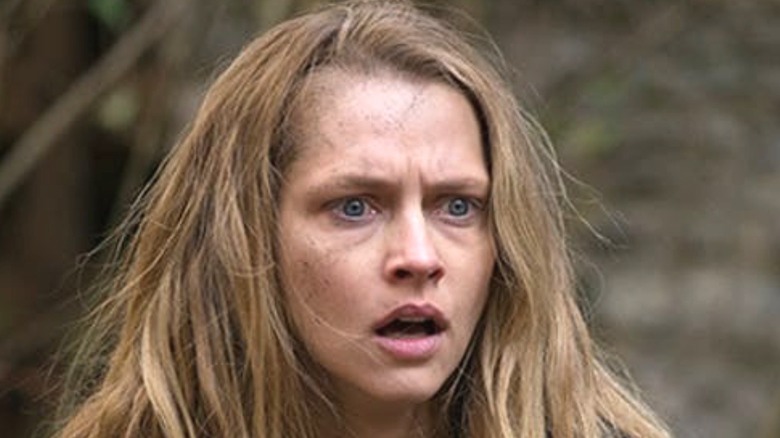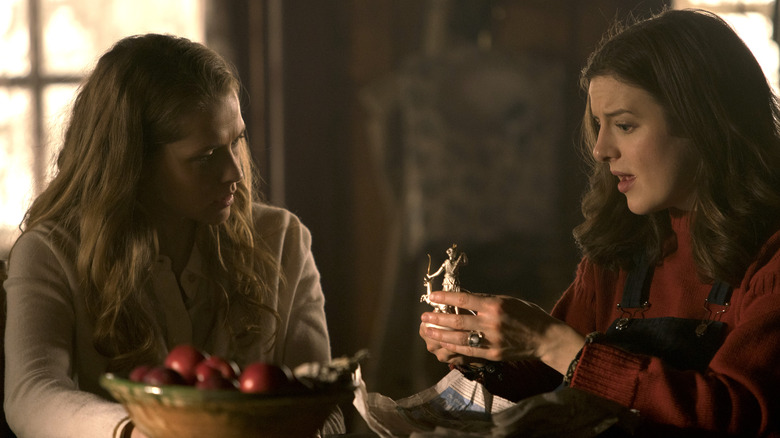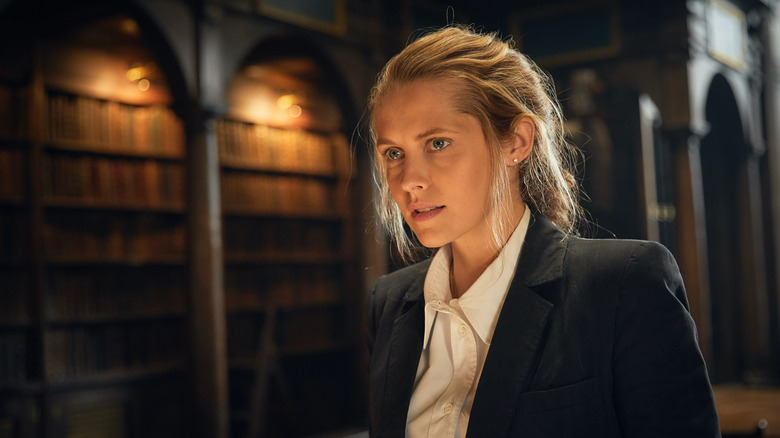What A Discovery Of Witches Does Worse Than The Books
Adaptations of popular book series are a tricky thing to pull off when it comes to television and film. No matter how well done they are, no matter how closely one sticks to the source material, book readers will never feel fully satisfied. Sometimes they're just being picky, but other times the criticism is justified. When it comes to "A Discovery of Witches," the Sky One fantasy TV series based on the "All Souls Trilogy" by Deborah Harkness, the biggest issues lie with the pacing of the narrative and the series' heroine, Diana Bishop, who is portrayed by Teresa Palmer.
At the beginning of both the book and the show Diana is a brilliant Yale historian and a reluctant witch who rarely uses her powers after the murder of her parents — two powerful witches in their own right. However, while doing research in Oxford, Diana discovers a long-lost manuscript said to contain the origin stories of witches, vampires, and daemons. The book is desired by many supernatural beings for its knowledge, so Diana's discovery of it immediately puts her in the crosshairs of some dangerous people, and she begins to embrace her powers as a means of protecting herself. The discovery also puts her on a collision course with a powerful vampire, Matthew Clairemont (Matthew Goode), and a romance begins to develop between the two despite an ancient rule that forbids the mingling of their kinds.
While the show tries to streamline the narrative of the lengthy novels, it doesn't always work. Not only does the magic suffer as a result, but the relationship between Diana and Matthew also feels flattened and rushed. Meanwhile, there is something missing in Diana. Let's dig into why this matters and how these things contribute to "A Discovery of Witches" being sometimes worse than the books
The magical elements are never fully explained
The first two seasons of "A Discovery of Witches" are eight and 10 episodes, respectively. This means there is a lot of context and detail from Harkness' detailed novels that never make it onto the screen. This is not surprising and actually fairly normal for television adaptations. The screen is a visual medium and can show things the books describe, often in great detail. Unfortunately, when it comes to the magical side of the story — Diana's many powers, the abilities of other supernatural beings, the laws that govern them — the show doesn't always spend enough time on them, and this can lead to confusion among viewers.
For example, most people understand the basic premise of what a witch is and what a vampire is and know the general abilities of both without a detailed explanation. But the same cannot be said about another supernatural being that makes up the third leg of "A Discovery of Witches," the daemon. As some fans have pointed out, the show doesn't take time to properly explain what daemons are or how their gifts differ from those of other characters. In Season 2, which sees Diana and Matthew travel back in time, it sometimes feels like the magic itself is lacking or limited. However, that could also be tied into the other thing "A Discovery of Witches" does worse than the books.
Diana Bishop is too flat in the show
Diana is meant to be the most powerful witch in existence. Although she has not accessed most of her powers by the time viewers meet her, they eventually find out she is spellbound, which limits her abilities. Her potential is off the charts. In Season 1, Matthew discovers through his clinical research that Diana possesses genetic markers for a number of different powers, including weaving, which means she has the exceptionally rare ability to create new spells. But even as the show progresses and Diana learns more about herself and the depth and breadth of her powers, she still often comes across as an inexperienced witch who is in over her head (via Screen Rant). She also doesn't seem to have the agency of the character in the novel. This doesn't bode well for the story of a woman who is supposed to go up against powerful foes and perform deeply complicated magic.
Some of the blame rests on the writing of the show, and it's understandable in a way. It's difficult to reach the same level of depth that is available on the page since viewers rarely have complete access to characters' thoughts. Some of the problems also rest with Palmer's performance, according to fans. She doesn't seem to be able to embody Diana with the same strength and fire that the character has in the book. As a result, Diana often appears to be out of her depth. Palmer, who is not American but Australian, has to work to maintain an accent that is not natural to her, which fans think might also contribute to the rest of the performance falling flat or appearing wooden.
Still, despite these aspects of the show failing to live up to their novel counterparts, "A Discovery of Witches" is a fun escape that provides plenty of entertainment. With the third and final season still on the horizon, it's also possible the show will have improved in these areas. Only time will tell.


